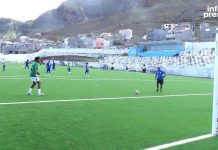Africa-Press – Cape verde. A study presented today in Praia, in partnership with the Government and the United Nations, recommends free water and more shade to protect children from climate change in Cape Verde.
“During extreme heat, the population should be supported with free water, with special attention to pregnant women and children in high-risk areas”, states the document Analysis of the Climate Scenario for Children in Cape Verde (CLAC).
The study suggests creating more shaded public areas to protect and include all children, reducing the risk of dehydration, heatstroke and skin diseases, especially for those with disabilities, in poverty or on the streets.
In addition, “priority” is recommended for adequate sanitation measures to prevent contamination of water and food during floods, with “special attention to the protection of children”.
Adolescents, especially girls, should have “reliable access” to drinking water in schools, with contingency measures in place in case of shortages.
It is also important to continue developing climate-resilient agricultural practices and promote sustainable land management alternatives to reduce children’s exposure to harmful chemicals.
The study highlights that the school meal programme should continue to be expanded and school gardens should be encouraged to teach children about agricultural practices, alongside environmental sustainability.
“School curricula should reflect the importance of climate change, equipping students with knowledge and skills that enable them to understand its effects and participate in climate action. Combating dehydration and heat stress is essential to ensure students’ learning and well-being,” the study points out.
In another area, related to state support, the Cadastro Social Único registration system should include climate vulnerability indicators to identify families exposed to risks, such as landslides.
Children and young people should also have frequent opportunities to participate in decision-making on climate action at the national level.
The study’s consultant, Deolinda Martins, explained that, although there is no concrete data, the focus on children comes naturally: “they have specific physiological and behavioral characteristics, in addition to a situation of dependency, which makes them much more vulnerable”.
“In all sectors, there are increased impacts on children when it comes to the effects of climate change. We are drawing up a five-year action plan, with several government institutions and civil society partners, which will try to make public policies and programs more sensitive to their needs”, she said.
Around 18.5% of children in Cape Verde live on less than 3.46 euros per day and 43% are in poverty.
“Poor children are at greater risk of being affected” by climate-related events, such as landslides, extreme heat and food insecurity, and this highlights the need for targeted public policies to ensure their safety and inclusion, she concluded.
The Secretary of State for Social Inclusion, Lídia Lima, present at the presentation, said that the information will serve as a basis for defining Government policies.
For More News And Analysis About Cape verde Follow Africa-Press






